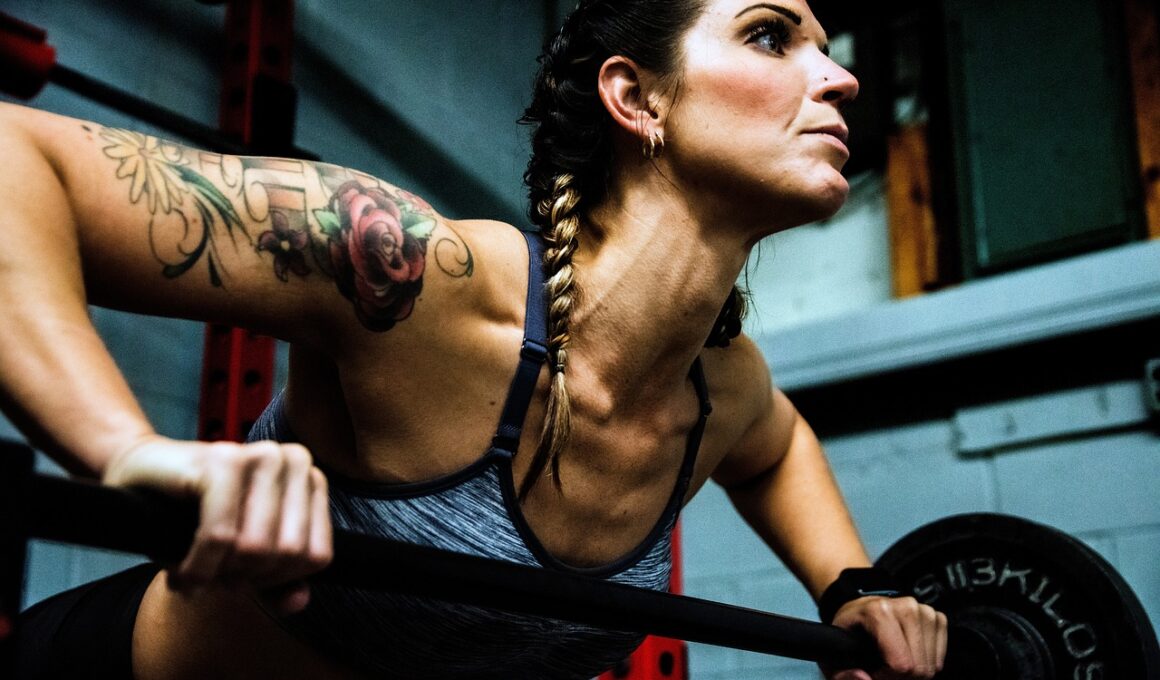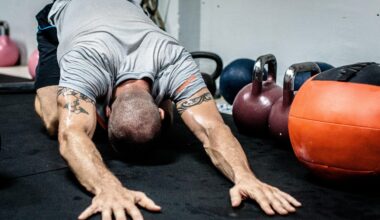Nutrition and Home Workouts: Fueling Athletes for Success
For athletes engaging in home workouts, understanding nutrition’s pivotal role is essential. Proper fuel ensures they maximize training efficacy and maintain peak performance levels. Nutrition involves more than just calorie counting; it encompasses the quality of food consumed. Nutrient-dense foods provide the necessary vitamins and minerals that aid recovery and muscle growth. Equally important is timing; athletes must consume appropriate meals or snacks before and after workouts to maintain energy levels. During intense exercise, maintaining hydration is critical. Water intake supports muscle function and prevents fatigue, making it vital for at-home training routines. Incorporating a variety of food groups guarantees a balanced diet, catering to the body’s diverse needs. Each meal should include a combination of carbohydrates, proteins, and fats for optimal energy and recovery. Furthermore, nutritional strategies must be tailored to individual goals. It’s essential for athletes to consult nutrition experts and create personalized meal plans. By applying these principles, athletes can transform their home workouts into effective training sessions, promoting long-term success. Ultimately, focusing on nutrition alongside training empowers athletes to perform at their best while enjoying the benefits of working out at home.
An athlete’s daily diet should be well-rounded to ensure that all macronutrient needs are met. Macronutrients include carbohydrates, proteins, and fats, each serving crucial purposes. Carbohydrates act as the primary energy source, fueling workouts and maintaining stamina. Whole grains, fruits, and vegetables are excellent carbohydrate sources. Proteins, on the other hand, help in muscle repair and growth. Including lean meats, legumes, and dairy in the diet supports this need effectively. Healthy fats from sources like avocados, nuts, and oils offer energy and support cellular functions. Moreover, athletes should consider micronutrients such as vitamins and minerals essential for overall health. Foods rich in antioxidants may help manage inflammation and accelerate recovery post-exercise. Furthermore, athletes should be mindful of their meal timing. Consuming a blend of carbohydrates and proteins within the critical window post-workout can enhance muscle recovery and replenish glycogen stores. Snacks like Greek yogurt or protein shakes can provide quick solutions when time is tight. Healthy meal prep strategies can be useful to ensure healthy options are readily available. Balancing these aspects promotes not just performance but overall well-being for athletes committed to their training regimes.
Hydration: The Unsung Hero of Athletic Performance
Hydration plays a significant role in athletic performance and recovery, affecting how effectively athletes perform their home workouts. Adequate fluid intake enhances energy levels and can prevent injury during exercise. Water serves as a vital component of every cell in the body, contributing to muscle metabolism and regulating temperature. With the potential for dehydration during intense workouts, particularly those at home, athletes must remain vigilant about their water consumption. They often overlook the importance of hydration. Signs of dehydration include fatigue, headache, and diminished performance. Athletes are encouraged to drink water throughout the day rather than just during workouts. Electrolyte drinks can be beneficial during extended workouts to balance lost minerals. Integrating hydrating foods like cucumbers, oranges, or smoothies can provide additional hydration. Each athlete may have unique hydration needs based on sweat rates and environmental conditions. Maintaining a consistent fluid intake strategy can enhance training outcomes and support overall health. Calibrating hydration practices with workout intensity and duration will yield positive results. Emphasizing hydration in conjunction with nutrition optimally positions athletes for success in their fitness endeavors.
Supplementation is an area many athletes explore to optimize their performance, particularly with home workouts. Nevertheless, the foundation of any effective supplement regimen begins with a balanced diet. Supplements can complement dietary patterns but are not replacements for whole foods. Key supplements for athletes may include whey protein, branched-chain amino acids, or Omega-3 fatty acids to support muscle recovery. Nevertheless, prior research and consultation with healthcare professionals are necessary to verify efficacy and safety. Athletes should remain informed about the latest studies related to these products. Understanding the timing of supplementation is as crucial as the supplements themselves. For instance, consuming protein shortly after a workout can promote muscle synthesis. Furthermore, it’s essential to avoid excessive reliance on supplements, as some can cause health issues if misused. Athletes are encouraged to track progress and dietary habits meticulously, adjusting supplement intake according to their training demands. Prioritizing whole-food sources first ensures they receive a broad spectrum of nutrients essential for performance. Ultimately, effective supplementation should enhance an athlete’s training routine, providing support and not becoming a crutch, ensuring training success during home workouts.
Meal Prep for Optimal Performance
Meal prepping is an effective strategy that athletes can adopt to maintain nutrition consistency amidst busy schedules. Planning meals ahead promotes dedication to dietary goals, especially when engaging in rigorous training programs. Preparing meals in bulk helps reduce stress and eliminates unhealthy eating options. Athletes can curate menus that correlate with their workout schedules and energy needs. A balanced approach would entail incorporating lean proteins, healthy fats, and carbohydrates to provide comprehensive fuel. For instance, grilled chicken with quinoa and vegetables serves as an excellent meal choice. Moreover, food storage solutions ensure these meals remain fresh throughout the week. Containers should be portion-controlled, promoting conscious eating. Athletes can also benefit from diverse recipes to prevent dietary fatigue and encourage creativity. Adding flavors while keeping health in mind ensures meals are enjoyable and motivating. Besides traditional meals, having healthy snacks on hand will deter athletes from veering towards unhealthy options. A mix of nuts, yogurt, and fruit can be ideal choices. Overall, a well-thought-out meal prep strategy can enhance dietary adherence, assist with recovery, and contribute significantly to performance during home workouts.
Along with meal prep, understanding the balance between calorie intake and expenditure is vital for athlete success. A precise caloric balance is necessary for performance, recovery, and overall health. Athletes often require more calories than the average person due to intense training regimens. Monitoring calorie intake helps athletes avoid excess weight gain while ensuring they have adequate energy for workouts. Calculating individual calorie needs can be facilitated by considering factors like weight, activity level, and goals. Online calculators or consultations with dietitians can aid this process significantly. Additionally, it’s crucial to source calories from nutrient-dense foods. Instead of empty-calorie snacks, athletes should prioritize whole foods that contribute to their energy and recovery. Tracking food intake through apps can also help monitor daily hormones, macronutrients, and mineral consumption. Consistency with caloric balance not only supports physical goals but also impacts mental clarity and focus during workouts. Athletes should set achievable targets based on their unique circumstances. Emphasizing the importance of a tailored approach ensures their home workout nutrition is not merely adequate but optimal for their specific performance objectives.
The Role of Recovery in Nutrition
Recovery stands as a critical component of athletic training, far exceeding mere post-workout relaxation. Proper nutrition is paramount in the recovery process for athletes engaging in home workouts. Having a solid post-exercise meal within the optimal recovery window can enhance muscle rebuilding and recovery effectiveness. This meal should ideally contain a mix of protein, carbohydrates, and essential nutrients that facilitate healing. For instance, a smoothie with protein powder, spinach, and bananas can provide necessary nutrients. Equally important is sleep—adequate rest nourishes recovery just as much as food does. During sleep, the body undergoes essential repair processes that are vital for athletes pushing physical limits at home. Supplementing nutrition strategies with hydration ensures the body stays replenished post-workout. Regularly incorporating anti-inflammatory foods such as berries or fatty fish can enhance the body’s ability to recover effectively. Moreover, athletes must listen to their bodies; fatigue or soreness can be signals that additional recovery is necessary. Allocating time in their training schedule for proper nutritional recovery promotes longevity in sports. An optimal balance between nutrition and recovery encourages all-around athletic success while working out from home.
Ultimately, nutrition and home workouts can collectively forge a path for an athlete’s overall success. Proper fueling, hydration, and recovery practices create a comprehensive approach to developing athletic performance. Individualized plans bolster resilience and adaptability, allowing athletes to thrive even in challenging circumstances. Regular assessments of both nutrition and performance help to refine these strategies, ensuring they align with training goals. Athletes should prioritize discussing their nutritional requirements with experts to develop tailored programs that consider personal constraints and targets. Additionally, attendance to family and community nutrition sessions can bring in valuable insights that strengthen their diet. Embracing this holistic view towards fitness empowers athletes to understand the interplay between nutrition and workouts, focusing on balance as the key to sustained success. Moreover, athletes can utilize technology to track their food intake along with workouts effectively. By combining knowledge, personalized nutrition, and structured training, athletes can maximally benefit from their home workouts. Eventually, these combined efforts can elevate performance and promote longer, healthier athletic careers, showcasing a lifestyle steeped in dedication to both nutrition and fitness.


